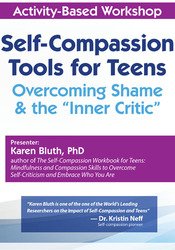

Participate in self-compassion strategies that can reduce stress, depression, and anxiety, while discovering how to build resilience and inner strength in the teens you work with. By watching this interactive recording, you will learn to help teens navigate these challenging years, by teaching regulation skills when emotions are skyrocketing, and practices to ease stress and bring comfort when the tough times hit.
Watch self-compassion expert and author, Karen Bluth, Ph.D, and become fully immersed in the practices of self-compassion for your teen clients. Even more importantly, you will learn a treatment plan to implement immediately!
This online program is worth 6.0 hours CPD.
| File type | File name | Number of pages | |
|---|---|---|---|
| Updated Manual (12.12 MB) | 41 Pages | Available after Purchase |

Dr. Karen Bluth received her PhD in Child and Family Studies in 2012 from The University of Tennessee, and is assistant professor in the Program on Integrative Medicine, Department of Physical Medicine and Rehabilitation, UNC School of Medicine. Dr. Bluth’s research focuses on the roles that self-compassion and mindfulness play in promoting well-being in youth. She has been called “the world’s leading researcher on the impact of self-compassion and teens” by self-compassion pioneer Dr. Kristin Neff, and has developed a self-compassion curriculum with Lorraine Hobbs entitled Making Friends with Yourself: A Mindful Self-Compassion Program for Teens. Dr. Bluth trains teachers internationally in this program. She was awarded a prestigious NIH T-32 post-doctoral research fellowship, along with a grant from the Mind and Life Foundation, which provided funding for ground-breaking research on the role of self-compassion in well-being for teens. With funding from the John Rex Foundation and NIH, she and her colleagues have begun to explore the benefits of mindfulness and self-compassion in at-risk teen populations, including those at risk for depression. Further, Dr. Bluth is an associate editor of the academic journal Mindfulness, the author of the book “The Self-Compassion Workbook for Teens: Mindfulness and Compassion Skills to Overcome Self-Criticism and Embrace Who You Are” (New Harbinger Publishers) and a contributing author of the books “Project You: More than 50 Ways to Calm Down, De-Stress, and Feel Great”, “Happiness Hacks: How to Find Energy and Inspiration”, “Me Time: How to Manage a Busy Life”, and “Stress Less: How to Achieve Inner Calm and Relaxation” (Capstone Publishers). Her research has been featured numerous times in Mindful magazine, on the Greater Good Science Center website, and through NICBM. As a mindfulness practitioner for almost 40 years, a mindfulness teacher, and a lifelong educator with 18 years of classroom experience, Dr. Bluth is frequently invited to give talks, conduct workshops, train teachers, and teach classes in self-compassion and mindfulness in educational and community settings internationally.
Speaker Disclosures:
Financial: Karen Bluth is an instructor at the University of North Carolina – Chapel Hill. She is an author for New Harbinger Publications and receives royalties. Dr. Bluth receives a speaking honorarium from PESI, Inc. She has no relevant financial relationships with ineligible organizations.
Non-financial: Karen Bluth is a member of the National Council on Family Relations.
Satisfaction Guarantee
Your satisfaction is our goal and our guarantee. Concerns should be addressed to info@pesi.co.uk or call 01235847393.
Please wait ...